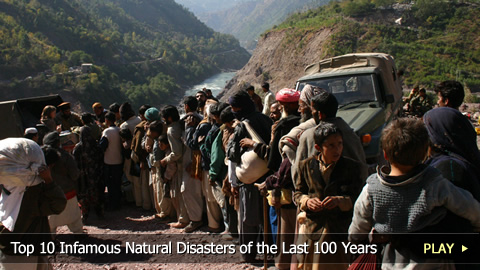Top 10 Infamous Natural Disasters of the Last 100 Years

- �� 1992 Hurricane Andrew [Deaths: 26; Damages: $40.7 billion]
- �� 2005 Hurricane Katrina [Deaths: +1,800; Damages: $108 billion]
- �� 2008 Sichuan Earthquake [Deaths: +69,000; Damages: $146.5 billion]
- �� 2008 Cyclone Nargis [Deaths: +138,000; Damages: $10 billion]
- �� 2011 Japan Earthquake and Tsunami [Deaths: 15,850; Damages: $235 billion]
- �� 1976 Tangshan Earthquake [Deaths: 242,419 – 655,000; Damages: $1.5 billion]
- �� 2004 Indian Ocean Earthquake and Tsunami [Deaths: 230,210 – 310,000; Damages: $15 billion]
- �� 1970 Bhola Cyclone [Deaths: 300,000 – 500,000; Damages: $450 million]
- �� 2010 Haiti Earthquake [Deaths: 316,000; Damages: $14 billion]
- �� 1931 Central China Floods [Deaths: Approaching 4,000,000; Damages: Incalculable]
#10 – 1992 Hurricane Andrew [Deaths: 26; Damages: $40.7 billion]
We start our list with a natural disaster that wasn’t particularly deadly, but was very expensive for the time. 1992’s Hurricane Andrew was a Category 4 hurricane that touched down mainly in the Bahamas, Florida and Louisiana in late August. With over $40 billion worth of damages resulting from this event, Andrew was the most expensive tropical cyclone to hit the U.S. to that point, until it was overtaken in 2005.
#9 – 2005 Hurricane Katrina [Deaths: +1,800; Damages: $108 billion]
Katrina was a huge story internationally, both for its devastation and for the government’s handling of the aftermath. On August 29th, 2005, it began ripping apart homes and ultimately left the region underwater. Casualties weren’t as massive as other entries on this list, but property damage topped $108 billion. Katrina was the United States’ most expensive hurricane ever, and it left New Orleans struggling to get back on its feet.
#8 – 2008 Sichuan Earthquake [Deaths: +69,000; Damages: $146.5 billion]
A magnitude 8 earthquake hit China May 12th, 2008, only to be followed by a series of strong aftershocks. The resulting homelessness and loss of life was shocking, but the financial burden was overwhelming: the Chinese government announced it would be spending over $146.5 billion to rebuilding after the costliest disaster in the country’s history.
#7 – 2008 Cyclone Nargis [Deaths: +138,000; Damages: $10 billion]
On May 2nd, 2008, just a few days prior to the devastating earthquake in nearby China, Burma was hit by its worst-ever natural disaster. Low-lying areas like rice fields offered little protection for residents. Damages of $10 billion were reported, and it has been suggested that casualties were purposefully underestimated to reduce negative political consequences.
#6 – 2011 Japan Earthquake and Tsunami [Deaths: 15,850; Damages: $235 billion]
Measuring a 9 on the Richter scale, this March 11th, 2011 disaster was Japan’s strongest earthquake ever, and one of the most powerful to have struck anywhere since 1900. Because the quake’s epicenter was off Japan’s coast, a violent tsunami followed and destroyed everything in its wake. Perhaps the scariest parts of this calamity were the ensuing meltdowns at the Fukushima Nuclear Power Plant. Damage of the entire event has been estimated at $235 billion, making it the costliest natural disaster ever.
#5 – 1976 Tangshan Earthquake [Deaths: 242,419 – 655,000; Damages: $1.5 billion]
This densely-populated Chinese city was shocked in the early morning hours of July 28th, 1976 by a huge earthquake, followed by a magnitude 7 aftershock just hours later. This was China’s second-deadliest earthquake, after another that occurred in 1556. The Chinese government rejected help in the aftermath, and was heavily criticized for ignoring early warnings by seismologists. The official death toll ranges greatly from 242 thousand to 655 thousand.
#4 – 2004 Indian Ocean Earthquake and Tsunami [Deaths: 230,210 – 310,000; Damages: $15 billion]
Fourteen countries were touched by this December 26th, 2004 disaster, and the most serious devastation was seen in Indonesia, Sri Lanka and Thailand. Monster tsunami waves almost 100-feet high ravaged coastal cities following the 9.3-magnitude quake. This earthquake was so strong it caused the entire planet to vibrate, tore people from their families and caused devastation that lasted years.
#3 – 1970 Bhola Cyclone [Deaths: 300,000 – 500,000; Damages: $450 million]
This was the deadliest cyclone in recorded history, and it hit East Pakistan on November 12th, 1970. At its peak, sustained winds of 115 miles-per-hour thrashed the region. However, most people died due to flooding because of the violent storm surge that followed. Entire islands and villages were destroyed, and the government was accused of mishandling the aftermath.
#2 – 2010 Haiti Earthquake [Deaths: 316,000; Damages: $14 billion]
The magnitude 7.0 earthquake struck Haiti’s most populated area on January 12th, 2010. Hundreds of thousands of deaths were caused by the country’s poor infrastructure, and despite immense support from across the globe, over one million people found themselves homeless in its wake.
#1 – 1931 Central China Floods [Deaths: Approaching 4,000,000; Damages: Incalculable]
Coming in at number one is the deadliest natural disaster in modern history. When the Yellow, Yangtze and Huai Rivers flooded in 1931, millions of people died due to drowning, famine and disease. The Yellow River is actually considered the deadliest river in the world, since it has flooded over one thousand times in the past two millennia. While the death toll of the 1931 event was tragic, it has been suggested that up to one quarter of the Chinese population, or roughly 51 million people, were affected in some way by this catastrophe.
